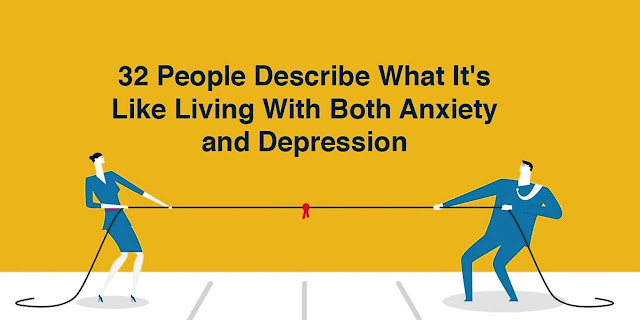
Anxiety and depression have been a growing problem in
society. So much so, that it has nearly approached epidemic status. Having
either anxiety or depression is difficult enough on its own, but many times
they occur simultaneously magnifying the negative effect of each. Fortunately,
there are now many drugs available to treat these conditions. Many of them
work extremely well. It is all about proper diagnosis and finding the right
medication, or combination of medications, that work best for the particular
individual.
Identifying Anxiety
People with an anxiety disorder tend to worry. Not just
a normal amount of worrying, either. If the individual is always displaying
disproportionate amounts of stress related to everyday events, this can be
categorized as generalized anxiety disorder (GAD). Symptoms can include
shortness of breath, racing heart, and chest tightness. Another type of
anxiety is situation specific or acute anxiety. The person may become
extremely nervous and anxious in certain social situations or have “episodes”
of perceived real danger and panic. These outbursts of anxiety include
what is labeled as “panic attacks”. To the person experiencing them,
there is nothing worse- they feel helpless and worried beyond control and may
even believe they are going to die. Anxiety disorders are complex and may
be generalized and ongoing or episodic. They can range in severity as
well. Although they are mental disorders, they have real and measurable
negative effects on physical health.
Identifying Depression
Depression is sometimes mistaken for another illness or
missed completely. It can have symptoms that vary greatly from person to
person. Just like anxiety, depression can be mild and short-lived, or
severe and ongoing. It can also be anything in between. Some warning signs
of depression include feelings of sadness, lack of motivation, thoughts of
hurting oneself or others, lack of interest in normal activities, along with
many others. Sometimes people with depression are irritable, display poor
hygiene, have trouble sleeping or sleep too much, among other behaviors.
Depression is just as difficult to diagnose as anxiety and left untreated can
be very dangerous to a person’s health and mental well-being.
Diagnosing Anxiety and Depression
Since both these disorders have no concrete method of
diagnosis, a trained physician must use his/her best judgment after examining
the patient and putting them through a series of tests and questions. Both
anxiety and depression can mimic other conditions so it is important to be
properly evaluated by someone who specializes in this area.
Treatment Options
Treatment for either disorder or the combination of the two
will be an overall plan decided upon by your doctor. Ideally, you should
sit with your doctor and come up with a strategy for treatment together, based
upon the diagnosis and expectations. Usually, oral medications will be
tried and then adjusted as necessary. Be patient, because most of the
medications used to treat these conditions take several weeks to build up in
your system. Your doctor may also want to include some lifestyle and
dietary changes as a complementary treatment to the medicine.






0 Comments